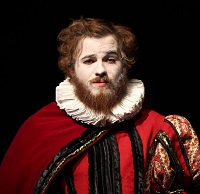Alex Robson
There are moments when our education and career just click. This was the case for UNE alumnus Alex Robson when he walked into his first theatre class. "That first lecture, with Adrian Kiernander and Sue Fell, is where my career began."
How did you come to study theatre at UNE?
“I grew up just down the road in Tamworth. Ironically, my high school career advisor told me just to study a BA so as to keep my options open, and yet the pressure to 'get a real job' persuaded me to do a Bachelor of Arts and Bachelor of Teaching. But when I realised the sheer scope of what the Theatre Department had to offer – and that I wouldn't be able to take all the Theatre units whilst doing my combined degree – I immediately changed courses. I completed a Bachelor of Theatre Studies, and then an Honours degree.”
Where has your career taken you since you’re studies?
“The skills I learnt at UNE allowed me to pursue a multidisciplinary career in the theatre, as an actor, director, playwright, dramaturg and producer. I co-founded the Armidale based Felt Tip Theatre Company with fellow UNE alumnus Chris Curcuruto, with which I did dozens of local small- and large-scale productions, including touring the state — Chris going on to pursue an international opera career. Once I relocated to Sydney, I co-founded Two Sticks Theatre with UNE Discovery staff member Anita Brown so as to mingle local talent with Sydney professionals. I founded Fingerless Theatre for my Sydney based projects, with which I have done several Shakespeare productions, as well as producing a new work by a Persian-Australian playwright. My arts practice also saw me direct an opera in Sydney – with Chris – direct two queer musicals at New Theatre, as well as various professional acting opportunities.
I had just been awarded a scholarship to study at Shakespeare's Globe in London, which blew my mind. A few years ago I studied Shakespeare at the Royal Academy of Dramatic Art, but this was something else. The last few years of my career have been characterised by doing a lot of Shakespeare, so this opportunity was profoundly exciting. And then the plague came, and as always happens, the theatres are the first to close. And that was the end of that.”
How has the current situation affected your work in the theatre industry?
“I was working on two Shakespeare shows in Sydney, 'Macbeth' and 'The Tempest', which were both cancelled. As was the workshop for a new musical I was working on as director and dramaturg, 'The Cleaners'. I also lost my full-time day job at a LEGO store, and I had to relocate out of Sydney so I could survive. Suffice to say, this year has been hard for me, personally and professionally. I do not wish to be pessimistic or defeatist about the state of the theatre industry – at least in Sydney – but things are terminally dire. One of the theatres I was set to work in this year has closed for good. Others are likely to follow. Artistic institutions, already wracked by funding cuts, are bleeding out. I have several friends who are acting students, now doing movement and scene classes over Zoom. Emerging artists and veteran professionals: all are out of work. The industry has been shaken to its very core.
But there is hope. I am now in Inverell, which was surrounded by the bushfires, which now seem a distant trauma but were only a few months ago. Things grow back, recover. To an extent. Crisis leads to opportunity. I was deeply moved and humbled to have recently secured a microgrant from Arts North West to run an online workshop series on Shakespeare's 'Romeo and Juliet' over Zoom for students throughout the region. My hope is to sow the seeds for live performances, locally developed, and regionally toured, once the theatres have opened back up again.”
Is there any advice you would give to aspiring theatre students or those in the industry?
Students and established theatre makers alike must now be more innovative than ever. The arts landscape has completely changed, and we must change with it. We have to hustle. We have to make our own opportunities. Students need to balance experience with study if they want to try and make it out there.

